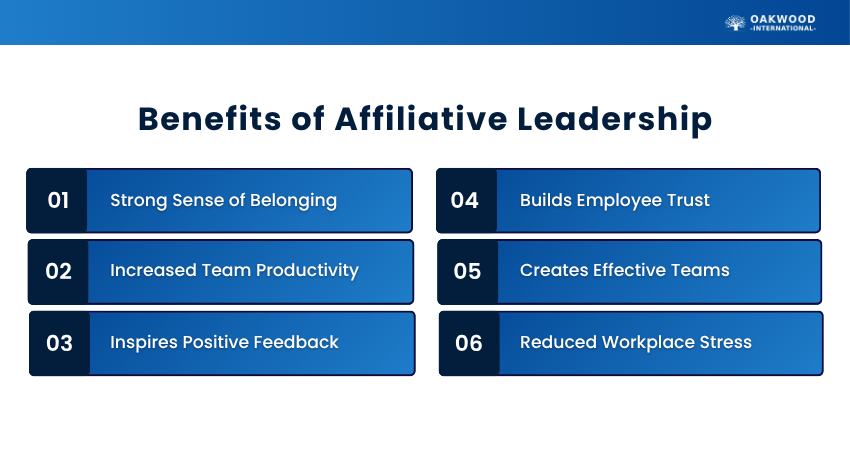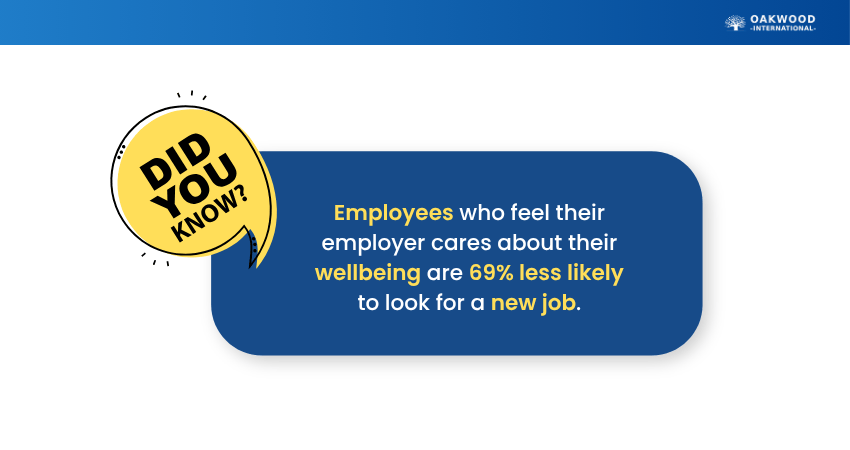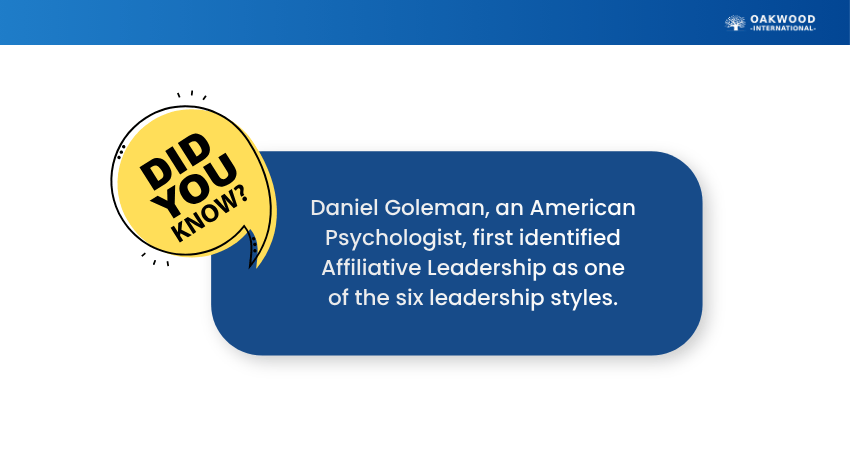Table of Contents


Affiliative Leadership is all about people; it’s the leadership style that builds bridges, not barriers. Rooted in empathy, trust and emotional connection, this approach focuses on creating harmony and lasting workplace relationships. Rather than leading through authority, affiliative leaders inspire through care and collaboration.
In this blog, we’ll explore what Affiliative Leadership truly means, its defining characteristics and the unparalleled benefits it brings to teams striving for unity and long-term success. So read on and transform how you inspire and engage others!
What is Affiliative Leadership?
Affiliative Leadership is a leadership style rooted in emotional intelligence and the ability to build strong relationships. It places people at the centre of decision-making and values harmony, connection and teamwork. Instead of encouraging competition, this approach promotes unity and a sense of belonging.
Reciprocity plays an important role in this style. When leaders show genuine care, appreciation and respect, employees tend to respond with the same positive behaviour. This supportive environment improves morale, deepens trust and contributes to stronger performance across teams.
The Characteristics of Affiliative Leadership
Affiliative Leadership is grounded in empathy, trust and emotional intelligence. Here are the core characteristics that define Affiliative Leadership:
1) Strong People Focus
1) People come first in Affiliative Leadership.
2) Leaders value both team and individual emotions, building strong emotional bonds and loyalty.
3) This connection often drives exceptional performance.
4) They celebrate successes personally through team lunches or one-to-one recognition.
5) This makes employees feel genuinely appreciated and valued.
2) A Strong Moral Compass
1) Affiliative leaders place ethics and integrity at the heart of their leadership.
2) Morals and values aren’t secondary; they guide every decision.
3) These leaders model honesty, empathy and authenticity, encouraging the same in others.
4) Their openness to expressing emotions nurtures a culture of genuine connection.
3) Good Communication
1) Positive and empathetic communication lies at the core of this leadership style.
2) Affiliative leaders use encouragement rather than criticism to guide behaviour.
3) This creates a safe environment for ideas and constructive discussions.
4) This catalyses collaboration and morale throughout the team.
4) Flexibility
1) Thanks to the trust and harmony they cultivate, affiliative leaders create adaptive workplaces.
2) Teams under this style thrive in change, needing fewer rigid rules or strict hierarchies.
3) This openness encourages responsiveness and innovation across the organisation.
Shape futures with certified expertise. Register for our ILM Level 5 Certificate in Effective Coaching and Mentoring now!
Benefits of Affiliative Leadership
From creating a strong sense of belonging to reducing workplace stress, Affiliative Leadership offers a wide range of benefits that support both people and performance:

1) A Strong Sense of Belonging
Teams led by affiliative leaders often feel closely connected. When people trust and care for one another, they work better together and handle challenges more easily. This strong sense of belonging helps everyone stay motivated, even during tough times.
2) Increased Team Productivity
Affiliative leaders make sure team members feel trusted and supported. When people feel comfortable asking for help, problems get solved quickly, thus improving teamwork and results.
3) Feedback That Drives Performance
Affiliative leaders focus on recognising good work and encouraging improvement. They give feedback in a positive way, helping employees feel confident. This supportive approach keeps morale high and motivates the team to do even better.

4) Builds Employee Trust
When leaders show genuine care and empathy, trust naturally grows. Employees feel safe to express concerns, share ideas and be honest about challenges. This transparency leads to stronger relationships, healthier communication and smoother collaboration across the team.
5) Creates Effective Teams
Affiliative leaders bring people together and create a sense of unity at work. When employees feel included, they are happier, more productive and more likely to stay. Such teamwork helps the group achieve goals faster and more smoothly.
6) Reduces Workplace Stress
Leaders who care about their team’s well-being help a lot in reducing stress and burnout. By encouraging kindness and open communication, they create a calm, friendly environment. This positive atmosphere boosts focus and overall job satisfaction.
Challenges of Affiliative Leadership
Despite its many benefits, Affiliative Leadership can come with a lot of challenges. These are the main stumbling blocks to consider:
1) Avoiding Unpleasant Situations
Affiliative leaders often prioritise harmony. This can make it very difficult to address issues like poor performance or missed goals. By avoiding uncomfortable conversations, they essentially risk letting problems grow over time. This will ultimately affect productivity and accountability.
2) A Risk of Underperformance
While a relaxed pace helps morale, it can sometimes slow progress. Without clear expectations or a timely push for results, teams may struggle to meet important deadlines. A balance between empathy and performance is essential.
3) Risk Feeling ‘Hands Off’
Affiliative leaders value respect and flexibility, but their gentle approach might be mistaken for weakness. Team members used to more directive leadership could misread their style as a lack of authority. This can potentially lead to confusion or reduced respect.
Build influence, boost performance and shape the future of your team with our ILM Level 5 Training - Sign up now!
Tips for Becoming an Affiliative Leader
The following tips will help you out in your journey towards becoming a powerful affiliative leader:

1) Use a Balanced Approach
1) Strike the balance between constructive feedback and praise to encourage continuous improvement.
2) Celebrate individual and team achievements regularly.
3) Offer honest guidance to help employees develop their skills.
4) Show understanding while keeping the team aligned with organisational goals.
5) Maintain a positive tone in feedback to motivate rather than discourage performance.
2) Equip Teams with Conflict Resolution Skills
1) Encourage a team culture where conflicts are handled calmly.
2) Organise workshops or training sessions focused on conflict resolution techniques.
3) Teach your employees to listen actively during disagreements.
4) Empower your team members to resolve minor issues independently before escalating them.
5) Step in only when necessary to mediate and maintain a positive team environment.
3) Pay attention to External Issues
1) Monitor every organisational change and external factor that you think may impact team morale.
2) Stay aware of workplace culture and make sure it supports employee well-being.
3) Identify those challenges that could impact productivity early on.
4) Communicate openly about the external pressures to maintain transparency.
5) Take proactive steps to help your team adapt within the organisation.
Examples of Affiliative Leadership?
Consider these prominent examples of Affiliative Leadership for more inspiration:
1) Howard Schultz (former CEO of Starbucks): Schultz emphasised emotional connections with the employees. He created a supportive culture and encouraged open dialogue and recognition.
2) Warren Buffett (Chairman & CEO of Berkshire Hathaway): Buffett is renowned for investing in people. He trusts his leadership teams and treat them as partners rather than subordinates. These are classic affiliative values.
3) Dalai Lama (Tenzin Gyatso, spiritual leader): He exemplifies the people-first, compassion-led approach. His leadership style focuses on harmony, empathy and respect for all.
4) Joe Torre (former Manager of the New York Yankees): Torre is often cited as a sports example of Affiliative Leadership. He builds team unity, recognises individual efforts and keeps a high‐performing but diverse team morale strong.
Conclusion
Affiliative Leadership reminds us that success starts with people. By seeding trust and empathy, any leader can nurture teams that thrive together. It’s a style that values connection over control. It proves that when people feel valued and supported, collaboration flourishes and extraordinary results follow.
Empower others while your own leadership journey soars. Sign up for our ILM Level 5 Diploma in Effective Coaching and Mentoring now!


 Back
Back



 Back to Catagories
Back to Catagories





 + 44 7452 122728
+ 44 7452 122728










